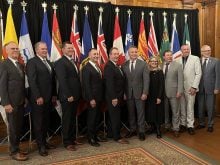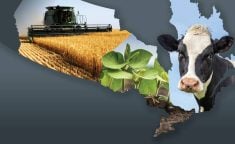The federal government’s plan to name a chief science adviser will be welcome — if the appointee has a broad knowledge of science and research in Canada and will speak out for it, say representatives of the agri-food sector.
Science Minister Kirsty Duncan issued a call for nominations that closes Jan. 27. She said the CSA “will be responsible for providing scientific advice to the prime minister, the minister of science and members of cabinet. This individual will also advise on how to ensure that government science is open to the public; that federal scientists are able to speak freely about their work and that science is effectively communicated across government. The office will be supported by a team of scientists and policy experts.”
Read Also

Tie vote derails canola tariff compensation resolution at MCGA
Manitoba Canola Growers Association members were split on whether to push Ottawa for compensation for losses due to Chinese tariffs.
Originally the position was to be an officer of Parliament who could report directly to MPs and senators much as the Parliamentary Budget Officer and other officials do. It’s not clear from Duncan’s announcement how much independence the adviser will be allowed.
Serge Buy, CEO of the Agriculture Institute of Canada, says that group supports the decision.
“But we would like to see the details and make sure that the mandate is clear and developed in consultation with various partners,” he said. “We hope that whoever takes the role has a good understanding of agriculture and agricultural research. Agriculture is a very important part of Canada’s economic success and it must not be neglected.”
Mary Buhr, dean of agriculture and bioresources at the University of Saskatchewan, says it’s crucial the appointee “be very cognizant that science is more than BlackBerry.”
“While one person can’t know everything about science, we need someone who can pull together experts from all fields for evidence-based decisions,” she said.
Politics tends to be short on men and women with science and engineering background, which makes the role of the science adviser all the more important, she added.
Jeffrey Wichtel, dean of the Ontario Veterinary College, says governments tend to be hijacked by special interest groups and the chief science adviser needs to bring sober second thought to programs and policies. That includes understanding the impact of climate change and environmental degradation. That needs to include a focus on risk management and dealing with new diseases and other threats that climate change will bring to Canada.
“It’s important for the science adviser to be a dispassionate voice,” Wichtel said. “The person needs to understand the one health concept gaining acceptance in the human, animal and environmental health fields. Essentially it says the health of people, animals and the environment are closely linked.”
A concern for Buhr and Wichtel is how accessible the science adviser or his or her staff will be to the non-governmental scientific and research community. They fear the group will be focused on co-ordinating science and research done by government departments and agencies.
Duncan noted that more than 35,000 federal employees are involved in science and technology activities. Also, nearly 50,000 researchers and trainees across the country are supported by the federally funded research councils.
“From clean air and water to food security and technological advancements, science plays a crucial role in providing the evidence the government needs to make decisions that improve the lives of Canadians,” Duncan noted.
“This search for a chief science adviser is a historic moment. This position is critical because science affects everything from the health and well-being of Canadians to the economy and the environment. Science is also the foundation of sound decision-making within government.”
She says the mandate of the position was developed after a rigorous process of consultation across government and review of best practices from around the world and advice from the research community.














